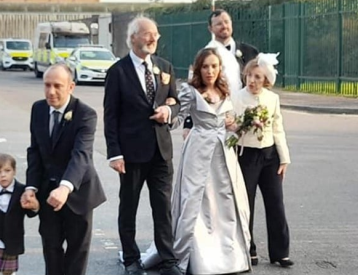Julian Assange’s legal team announced “serious submissions” would be made to the UK Home Secretary, who will decide on the WikiLeaks founder's extradition to the U.S., reports Sara Chessa.
THE EXTRADITION of Julian Assange to the U.S. was formally approved by a UK court earlier this week, with Secretary of State for the Home Department (Home Secretary) Priti Patel expected to make the final decision in the second half of May.
However, the WikiLeaks founder’s legal team still has several options to oppose the extradition.
In the hearing held in London on Wednesday, chief magistrate Paul Goldspring told Assange he was “duty-bound to send your case to the secretary of state”.
At the same time, Mark Summers QC from Assange’s legal team announced “fresh developments” and said “serious submissions” would be made to Patel regarding sentencing and other issues.
In December, the High Court ruled that the Australian journalist could be extradited, as U.S. assurances were considered acceptable. Based on such promises, the WikiLeaks publisher would not be detained in the inhumane special administrative measure (SAM) system, where prisoners can also spend time in chains and face similar cruel treatments.
However, those assurances were sent in a diplomatic note only after the first instance hearing. Therefore, the Assange legal team had no chance to discuss them in court and challenge their reliability. Human rights organisations strongly criticised the U.S. document.
In March, Assange tried to appeal to the Supreme Court against the High Court decision, but it refused to hear him. He appeared via video link during Wednesday’s hearing, confirming his name and date of birth.
Activists outside the court were calling for his liberation and chants could be heard inside the building. Public figures like former Labour party leader Jeremy Corbyn joined them.
Said Corbyn:
“Assange has done no more than telling the world about military planning, military policies and the horrors of wars in Afghanistan and Iraq. He deserves to be thanked.”
One of the options available for Assange’s lawyers would be appealing to the European Court of Human Rights (ECHR) in Strasbourg. However, the fact that it could take a certain number of years to come up with a decision makes commentators think the Assange legal team will most likely cross-appeal against the first instance ruling.
It will be a cross-appeal because the U.S. already brought that verdict to the attention of a superior court.
Assange could do it — not to overturn the denial of extradition obtained there in the first instance, but to challenge the fact that extradition to the U.S. has to be stopped only for reasons related to mental health, as ruled at that time.
In other words, there are critical points that the first instance judge did not consider as relevant in denying extradition. Namely, the fact that the U.S. presented the request for political reasons — the Extradition Treaty between the UK and the U.S. prohibits this.
Or, the fact that Article 10 of the European Convention on Human Rights protects freedom of speech and clashes with the decision to send a publisher to the U.S.
Also, U.S. witness Sigurdur “Siggi” Thordarson admitted to having wholly invented his allegations against Assange — allegations that form the foundations of the U.S. indictment.
The fourth issue Assange could rely on for his cross-appeal is the fact that hacking charges are unfounded, as Patrick Eller – a forensic computer analyst – has shown.
Last, but not least, the defence team could appeal against the fact that the first instance judge did not consider as a problem the use of the American Espionage Act of 1917 against a journalist and publisher — the one law that does not allow the defendant to say that the release of classified information was done in the public interest.
The defence could appeal by leveraging one or more of these points. Then, the trial would start anew, with witnesses heard again by the court.
Now, is the time to add pressure – in a very peaceful way – like Reporters Without Borders (RSF) with its new petition, which everyone can sign.
Suppose the Home Secretary doesn't understand the responsibility she has in terms of saving media freedom and democracy? In that case, the battle will hinge on the cross-appeal, focusing on the five points mentioned above — its outcome, crucial to every citizen of the planet.
Sara Chessa is a UK-based independent journalist. You can follow Sara on Twitter @sarachessa1.
Related Articles
- Father of Assange, John Shipton, speaks for human rights in Rome
- Julian Assange's family tirelessly advocate for his freedom
- Rotten rulings — Julian Assange's extradition appeal denied
- Walker, Assange and the 'climate kids': Signs of a broken legal system
- Assange wins right to appeal against extradition
 This work is licensed under a Creative Commons Attribution-NonCommercial-NoDerivs 3.0 Australia License
This work is licensed under a Creative Commons Attribution-NonCommercial-NoDerivs 3.0 Australia License
Support independent journalism Subscribe to IA.














